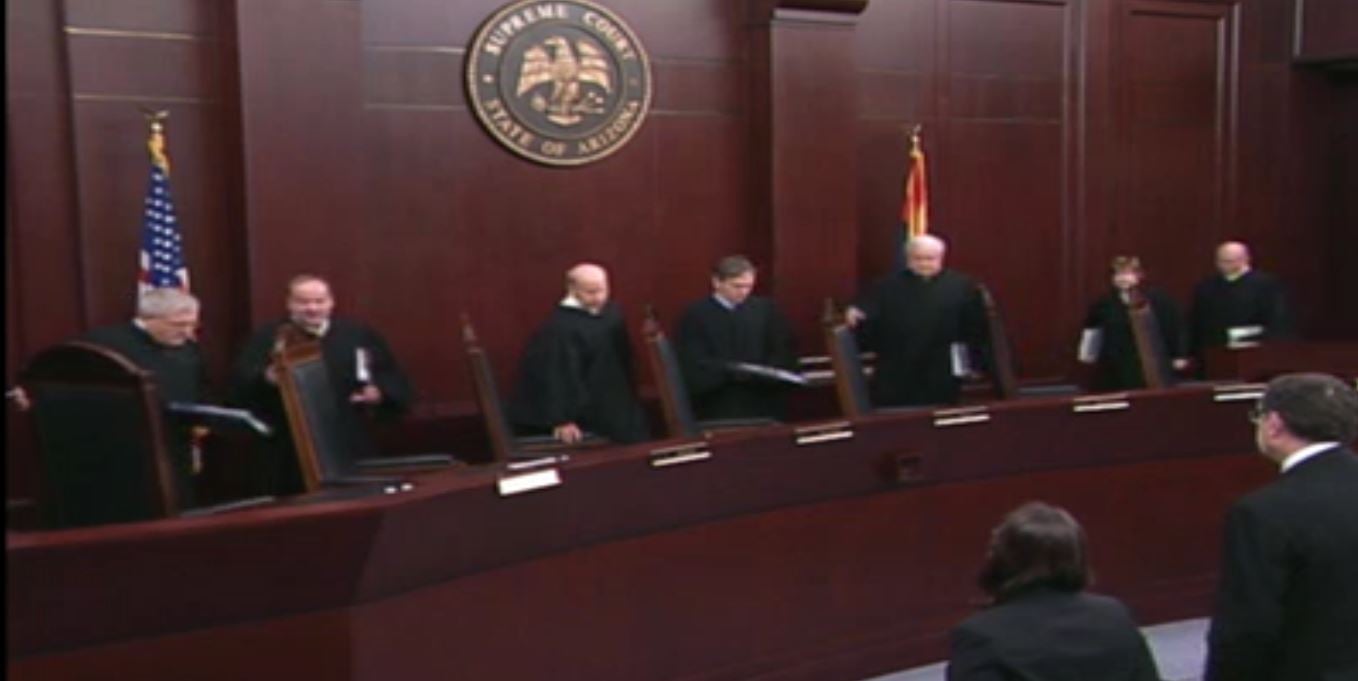PHOENIX (CN) — The Arizona Supreme Court heard arguments Tuesday over whether there is a First Amendment right of access to the names of jurors.
The case stems from two Covid-era criminal trials in rural Cochise County, where juror names remained anonymous during and after the trial. The judge in those cases referred to the jurors by numbers instead of their names, masking the jurors' identities.
Before Covid-19, reporters could view the juror selection process in person and see the jurors participating in a trial.
Terri Jo Neff, a freelance journalist based in Cochise County, and David Morgan, publisher of the Cochise County Record, filed special actions in each case over the restrictive procedures. Morgan is a former Courthouse News employee.
The Arizona Court of Appeals found this past year that trial courts have the authority to proceed with anonymous or innominate juries and the journalists failed to show “disclosure plays a significant positive role in the process of a criminal trial.”
The journalists, represented by Evan Stele from the First Amendment Clinic at Arizona State University's Sandra Day O’Connor College of Law, tried to prove Tuesday that the use of innominate juries is outside the bounds of constitutional law.
Stele argued that transparency in the judicial process is important, pointing to the importance of how the government is engaged in the selection of jurors.
“Who's going to be making the decision in criminal cases, who's going to be sending people away for years,” said Stele. “That's part of the process and that's part of how the government is engaging in the selection of jurors.”
Stele later suggested individuals would be able to inspect the racial dynamics of a jury pool with a juror roster, which struck a chord with Justice Bill Montgomery.
"You can have a Hispanic surname by virtue of marriage and not have any Hispanic Heritage, so how do names themselves help in that regard?" Montgomery asked. "If you try to eyeball somebody and figure out their race, good luck in a multiracial society."
The justice also questioned Stele’s assertion that records like these are “public rights.”
“So, a member of the cartel could come in, and their smuggler employee is on trial, they can ask for a list of all the names, and the court has to give it to them?” Montgomery asked.
Michael Powell with the Cochise County Attorney’s Office argued that Maricopa County, Pima County and the district courts have local rules prohibiting the release of juror names.
“It very clearly states that juror information which includes the name shall not be disclosed,” Powell said, referencing a 2017 rule about jury confidentiality.
The 2017 rule applied to a pre-Covid courtroom. Post-Covid courtrooms and courtrooms that are now open to more virtual proceedings come with unique challenges, said Vice Chief Justice Ann A. Scott Timmer.
“You used to be able to go down and watch for yourself and hear people’s names,” Timmer said.
Justices acknowledged the rules of the local courts but reminded Powell that the court considers nationwide precedence, not just matters of the local jurisdiction.
Marjorie Becklund of the Arizona Attorney General’s Office told the court there is no consistency in these matters.
“Across this country, different jurisdictions and different courts view this issue of access to juror names differently,” Becklund said. “And there's nothing from the U.S. Supreme Court that has identified and definitively said that the press and the public have a right to know the names of the jurors prior to beginning the trial.”
Morgan told Courthouse News after the hearing that transparency is vital for a functioning court system. Rural counties have unique challenges, he says, and wrongdoing is hard to expose with the overlay of a lack of staffing.
“All of our judges are elected,” said Morgan about the judges in his county. “They're looking for every little way to remove the possibility that they will uncover some other error.”
Morgan said anonymous jurors pose a unique threat to the justice system.
“They're likely to convict 15% more often than if they're not,” Morgan said, citing a study from the Cornell Law Review. In the study, researchers found potential biases in a defendant’s presumption of innocence based on a juror’s anonymity. The study also found innominate jurying is an artifact from when judges were concerned over juror safety against defendants involved in organized crime.
Morgan indicated behaviors like those on Twitter differ based on the same juror standard.
“If you don't have to take responsibility for what you're saying, then your attitude toward what you say changes,” Morgan said.
The court did not indicate how or when it would rule.
Subscribe to Closing Arguments
Sign up for new weekly newsletter Closing Arguments to get the latest about ongoing trials, major litigation and hot cases and rulings in courthouses around the U.S. and the world.









